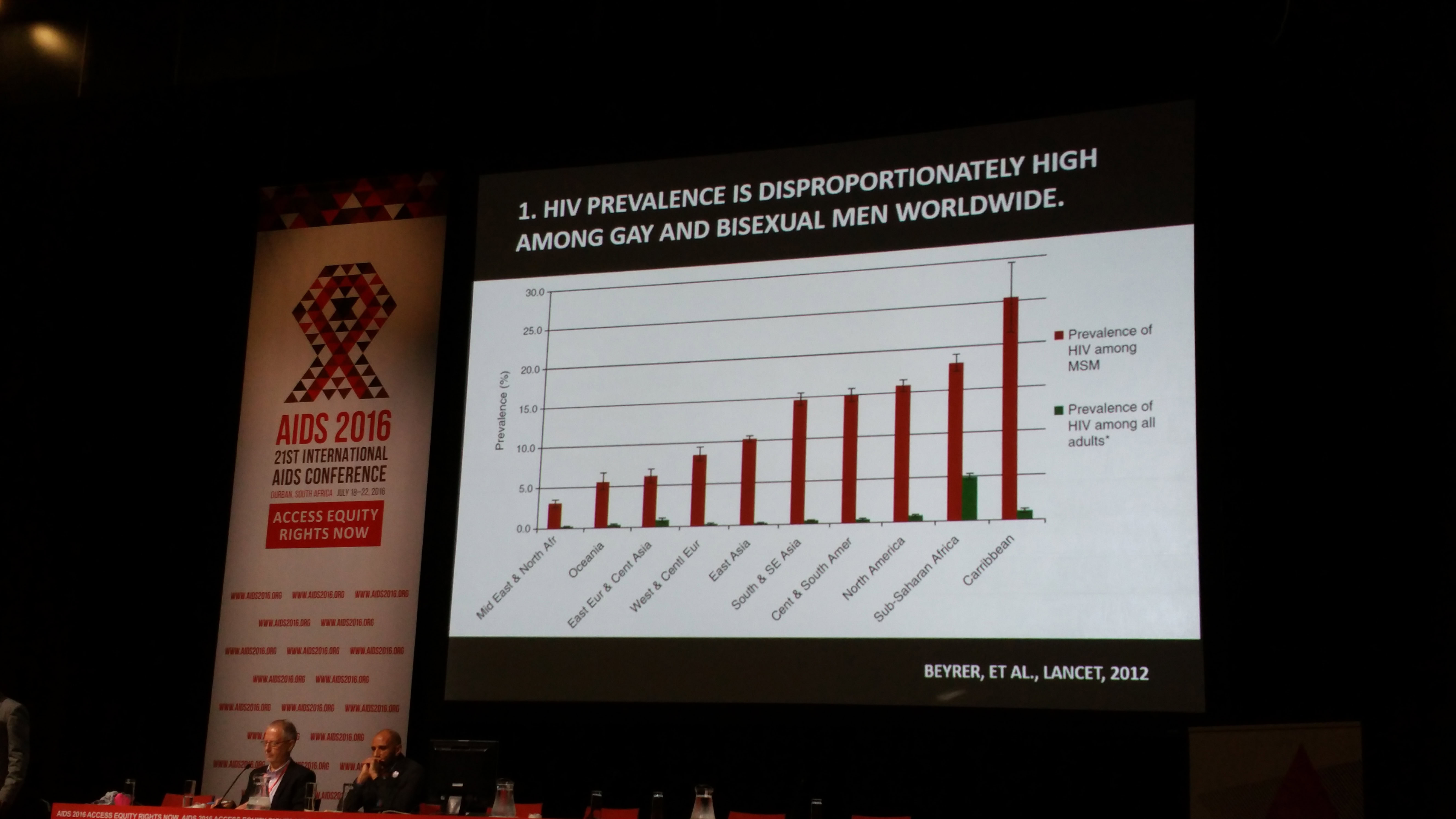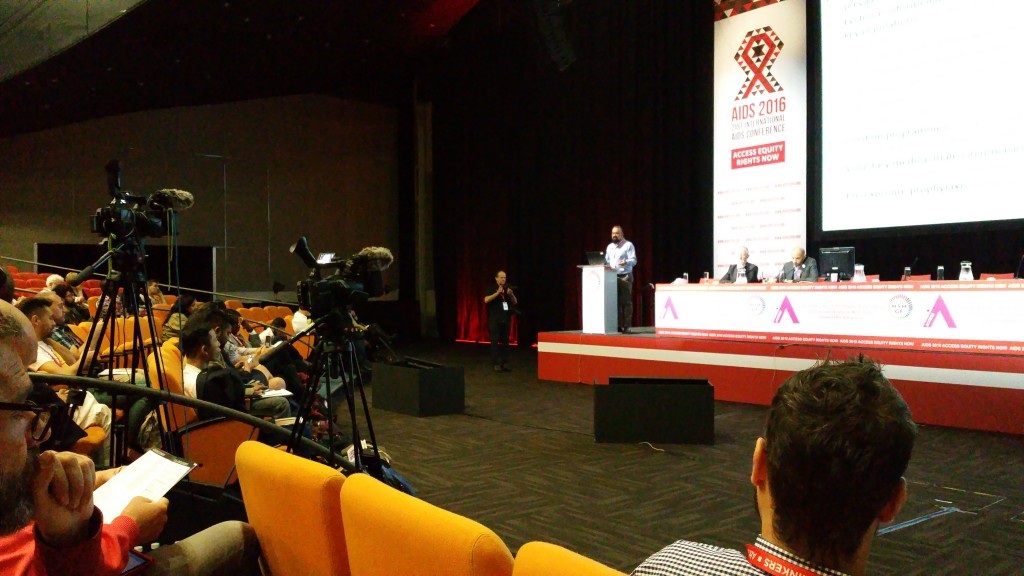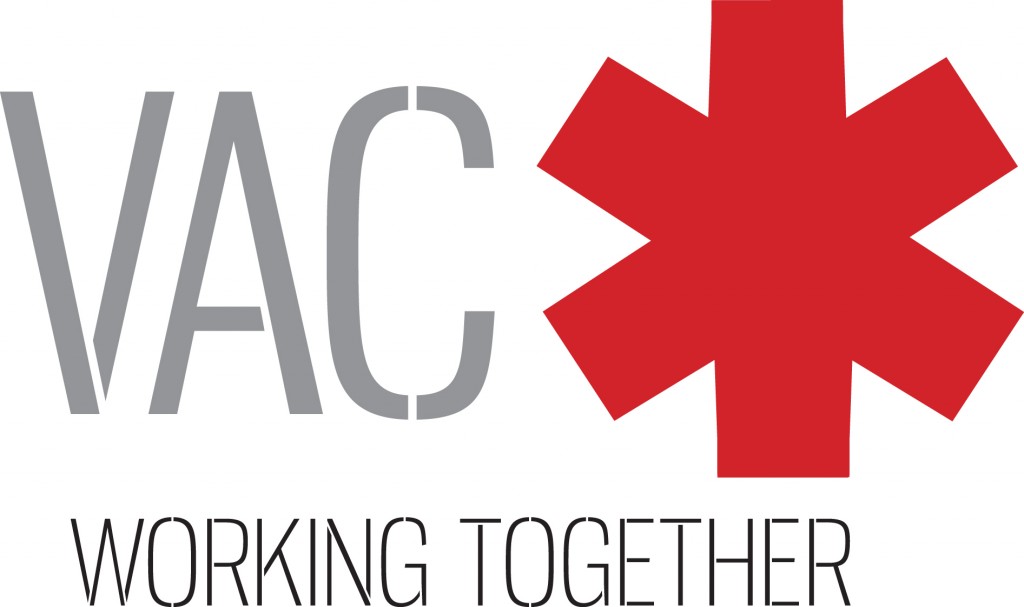
AIDS Conference 2016: What’s making HIV worse for gay and bisexual men

WIDESPREAD homophobic violence and the exclusion of gay and bisexual men at the top levels of the global response to HIV and AIDS are halting efforts to fight the epidemic, according to experts at the International AIDS Conference in Durban, South Africa.
Researchers, activists and health officials said one of the major barriers to halting HIV and AIDS epidemics among men who have sex with men (MSM) is continuing human rights abuses towards gay and bisexual men, particularly in parts of Africa and the Middle East.
In much of the world, gay and bisexual men are actively excluded from HIV services, or the fear of homophobic violence means they are unwilling or unable to access those services.
Executive Director of the Global Forum on MSM and HIV (MSMGF) George Ayala told Star Observer the situation has even gotten worse for many gay and bisexual men when it comes to HIV.
“We have stagnated, and I think we’ve worsened, and that’s primarily because governments and people who are in decision-making roles are reluctant to talk about sex and sexuality, and they’re certainly reluctant to talk about homosexuality and gay men’s issues,” he said.
“Homophobia is a huge barrier all over the world, not just here in Africa but everywhere, and it really is stalling our progress. We now know that gay men are among the only populations for which HIV remains uncontrolled, and we can’t say that about any other population. In some cases things are getting better… that’s not true for gay men.”
The MSMGF runs one of the day-long mini-conferences before the main AIDS 2016 program, and this year it opened with some of the world’s top HIV researchers and officials sharing their frustration at the gap between positive rhetoric on “ending AIDS” and the bleaker reality many are living.
Even in countries that have what are called “generalised” HIV epidemics, such as those in parts of Africa, key populations such as MSM still bear a greater burden.
“We’re really losing ground on HIV prevention… LGBT people remain open targets for violence everywhere in the world,” Ayala told attendees.
“Violence complicates our ability to respond to HIV… it doesn’t matter how great the HIV services might be, if men feel stigmatised when they show up at the door, they won’t access these services.”
Some researchers pointed out that the even available on MSM populations and HIV often can’t be trusted.

Meg Davis from New York University’s Centre for Human Rights and Global Justice gave the example of Hungary, which reported they were testing 100 per cent of their MSM population, despite only having testing 388 men.
Unsurprisingly, countries with more widespread homophobia report smaller overall MSM populations—if they are acknowledged at all—which in turn makes it harder to advocate for MSM-specific responses to HIV.
Delegates were encouraged to “call out” speakers during the main conference if they believed MSM were being excluded.
Throughout AIDS 2016, MSM and other key populations affected by HIV and AIDS—sex workers, trans people and drug users, for example—have expressed frustration and anger at the outcome of a high-level UN meeting last month in New York on ending AIDS.
Despite making the bold commitment to “end the AIDS epidemic by 2030”, the UN’s Political Declaration on HIV and AIDS barely mentioned key populations, the result of a campaign by UN member states including Russia, the Vatican and a large number of Islamic countries.
MSMGF Founding Co-chair, Australian Don Baxter, told Star Observer that despite the disappointing outcome in New York, there were ways to move forward.
“I caution against taking too much notice of the high-level meeting, because it’s devised in a hothouse atmosphere in New York, mostly by people who know nothing about HIV,” he said.
“Advocates and activists in every country need to use the parts of it that are good, and just not mention the rest. With these documents there will be very few people in each country that actually read it, so I think what we need to be doing is picking out the good bits and emphasising those.”
Baxter also said UNAIDS, the body that coordinates the UN’s HIV and AIDS response, has since directly criticised the failure of countries like Russia to include key populations in their HIV response, and that more are people are dying as a result.
Although the outlook for many MSM in parts of the world is bleak, AIDS 2016 delegates have acknowledged the progress made on some fronts.
The MSMGF said this year’s conference had more of a focus on MSM in the main program than ever before, reflecting a broader commitment to engaging with key populations.
Pre-exposure prophylaxis for HIV (PrEP) also presents new opportunities for HIV prevention among MSM, although it remains inaccessible for most, particularly in parts of the world where homophobia is most rampant.
“I think that this really ought to be the conference where the PrEP access era begins in earnest,” said International AIDS Society President Chris Beyrer at the MSMGF pre-conference opening.
George Ayala also said the work done at the pre-conference in particular represented the impressive ability of gay and bisexual men to make themselves heard on an international stage, particularly when their voices are excluded.
“Many of the speakers here insisted on taking the space and making it our own,” he told Star Observer.
“We have to remember to keep coming back to discussions that have to do with our bodies, and sex and sexualities.”
The International AIDS Conference in Durban runs from 18–22 July, following the previous conference held in Melbourne in 2014.
 The Victorian AIDS Council (VAC) is supporting Star Observer’s coverage of the 2016 International Aids Conference in Durban by providing travel and accommodation for a VAC staff member to attend as a journalist. Star Observer retains editorial control over the content published as part of this agreement.
The Victorian AIDS Council (VAC) is supporting Star Observer’s coverage of the 2016 International Aids Conference in Durban by providing travel and accommodation for a VAC staff member to attend as a journalist. Star Observer retains editorial control over the content published as part of this agreement.









